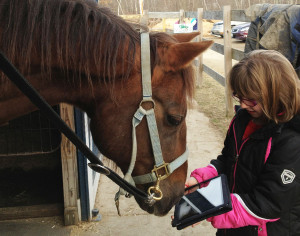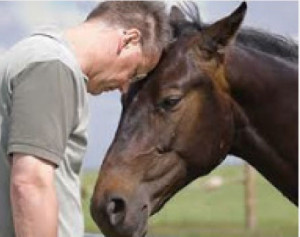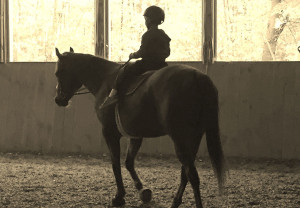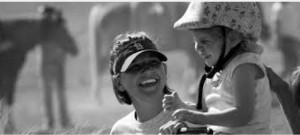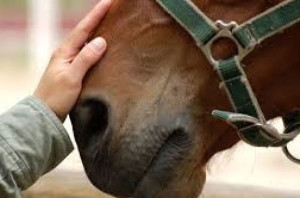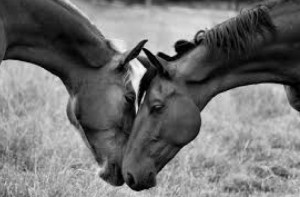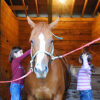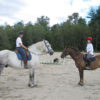Equine Facilitated Psychotherapy is a form of psychotherapy that involves horses and a licensed mental health professional. The horse is a great co-therapist due to their prey nature. They live in large herds and rely on these social networks for their survival. As a result, they are very aware not only of their physical surroundings, but also the social dynamics of the herd and others. Horses typically view humans as being part of the herd and will engage socially with them – offering many nonverbal cues that indicate their thoughts and feelings. It is this social dynamic that is the basis and foundation for Equine Facilitated Psychotherapy.
EFP @ Wild Irish Farm
Here at Wild Irish Farm, we employ a few of the above mentioned techniques and try to determine which format is best suited for each client. Riding is never a requirement of our clients, but rather an option. However, horses are always a part of our environment as all of our offices are other located in the indoor arena or in the barn. We are constantly surrounded by horses!
Our first contact with clients occurs during our intake session. This a complementary session to orient ourselves to the needs of the client and to provide an opportunity for families to see our facilities and observe how all interact with this unique environment. During the intake session, we will also schedule the next session if all agree that it is a good match. Within the first 30 days, each of our clients is given a treatment plan. Both clients and their families have a role in writing this plan. It is this plan that drives our work and helps us determine what issues we will focus on. Further, we re-evaluate the treatment plan every 6 months to determine which goals have been achieved, how the goals have changed and proximity to discharge. We have experience working with a multitude of issues and diagnoses – including:
Acute Stress Disorder
ADHD
Adjustment Disorder
Anxiety
Autism Spectrum Disorder
Bipolar
Depression
Grief
Intellectual Disabilities
Mood Disorders
OCD
ODD
PTSD
Reactive Attachment Disorder
Selective Mutism
Traumatic Brain Injury
We currently have two full time clinicians and an intern who work with our clients. Each brings a unique set of skills that are applied to their work with the kids and the horses. As a result, sessions may look very different depending on which clinician the child is working with. Visit “Our Team” page for descriptions of the experience that our clinicians have and how they apply them to their work.
Fees & Insurance at WIF
EFP is covered by most insurance companies under the category “Interactive Psychotherapy.” However, Wild Irish Farm is not in network with any insurance companies. As a result, coverage is dependent on out of network benefits.
Payment is due at the time services are rendered. Our hourly rate ranges from $50-$150 depending on which clinican your child works with.
For those with out of network benefits and who are working with a clinician who can bill insurance, we are happy to submit claims on your behalf. Insurance companies will send reimbursement checks to the client.
If you have questions regarding insurance coverage, please contact us and ask. We are always happy to reach out to your insurance company and inquire about coverage and benefits.
There are numerous barriers to entry into the efp field – including expense, availability of facilities, a lack of experience either clinically or with equines, and opportunities to practice this technique. Since opening our doors, there have been many students and practitioners who have voiced interest in learning how to do equine facilitated psychotherapy. All have complained that opportunities are limited and frequently expensive.
The internship program was started in 2012 in collaboration with UNH in the hopes that we could provide more opportunities for students to get their “hands wet” in this emerging field. Our first intern joined us in the fall of 2012. The dual degree program of outdoor education and master in social work has proved to be a fantastic match with the experiential nature of this work. However, we are always interested in working with students who have interest in this field. Our ultimate goal is to have others in this area doing this kind of work.
If you are interested in an internship here at Wild Irish Farm, please contact Laura. Opportunities may be available not only for students working towards their masters, but also for clinicians looking for a chance to try their hands at efp.
Frequently Asked Questions about EFP
What is the deference between EFP and Therapeutic Riding?
Equine facilitated psychotherapy occurs with a licensed mental health worker – such as a psychologist, clinical social worker, or counselor. The focus is typically on the obtainment of traditional psychotherapeutic goals – such as increasing the ability to focus, learning new social skills, developing anger management skills, etc. Therapeutic riding does not typically have a licensed mental health worker. Further, their goals may include some of the goals listed above, but may also include occupational therapy goals and physical therapy goals.
How does EFP work?
In many ways the answer to this question is as varied as the clients we work with. The focus of treatment really determines what the program will look like for each individual client. Frequently – sessions incorporate work with horses. Often times, the work may involve ground work (especially grooming), observation, and spending time with the horses at liberty (in their paddock). The hope is that while we are working with the horses, some of the issues that brought a client to us will surface so that we can address them in the moment. The horses help make these issues concrete and observable. Further, as the client changes their behavior, the horse will also change his behavior. Thereby giving the client immediate feedback. We work hard to help clients develop plans to apply these lessons to everyday life.
How long does EFP take?
Just as with traditional psychotherapy, the answer to this question depends on each client. What we have found is that clients are often more motivated to come to the farm than to a traditional office and often walk away with giant smiles on their faces. Although some clients respond quickly to this form of treatment and make rapid changes, others take longer.
Who would benefit from EFP?
We like to say that our ideal candidate is somebody who is in need of psychotherapeutic services and loves horses. We work with children ages 5 – 22 who carry a variety of diagnoses. These may include mental health diagnoses, pervasive developmental disabilities, and learning disabilities. We hesitate to accept clients who have a history of injuring animals or are actively psychotic due to concerns either for client’s safety or our animals safety.
How do I sign my child up?
If you are interested in having your child work with us, you can contact Laura either via email or telephone. An initial session can be scheduled at that time.

